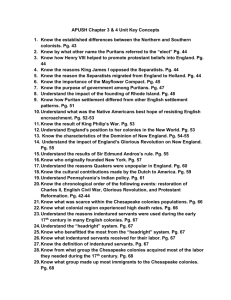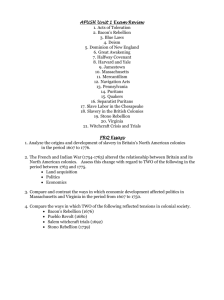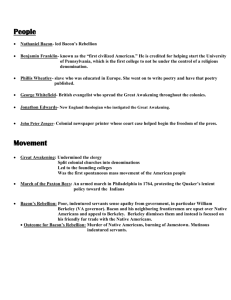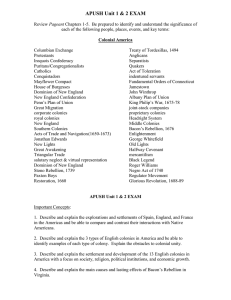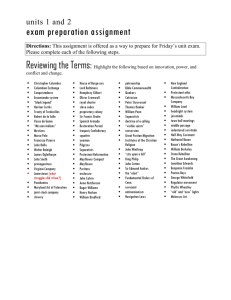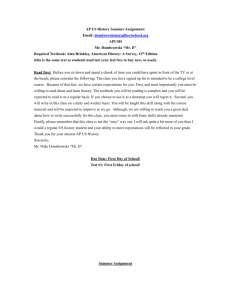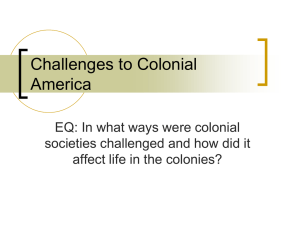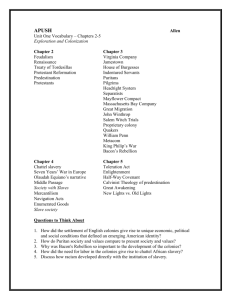"Event" Pwrpt
advertisement
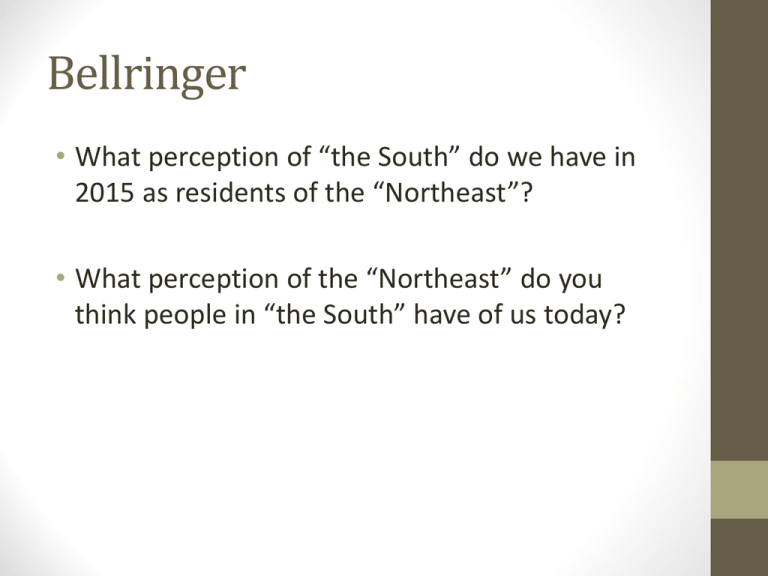
Bellringer • What perception of “the South” do we have in 2015 as residents of the “Northeast”? • What perception of the “Northeast” do you think people in “the South” have of us today? Formative Events in Colonial America 1607-1754 Central Issue • East vs. West • Tidewater v. Piedmont • Urban v. Rural Event Review 1. 2. 3. 4. 5. 6. Founding of Jamestown Founding of Massachusetts Bay Bacon’s Rebellion Creation of Dominion of New England Trial of John Peter Zenger Great Awakening Causes = (Long-term? Short-term?) Event Effects = (Short-term? Long-term?) Reflect • What are some examples of the tension between east & west in Colonial America? • How are these similar to the perceptions of the South & Northeast? Timeline Jamestown What factors aided European Exploration in the 15th Century? • Improvements in Technology • Renaissance • Creative vitality/increase in scientific knowledge • Religious Conflict Spread religion • Catholic victory and unification in Spain • Protestant Reformation • Expanding Trade • Competition for increased trade with Africa, China, and India • Developing Nation-States • Strong monarchs depended on trade to bring in needed revenues What Factors led to the building of Empire? • Growing population – 3 million in 1550 4 million in 1600 • Enclosure Acts forced small farmers off the land • Economic Depression • Primogeniture laws • Creation of Joint Stock Companies • Peace with Spain • Thirst for markets, adventure, religious freedom What were the factors that led to the founding of Jamestown? • King James I (1st Stuart king) • 1607 • A Corporate colony – operated by a joint-stock company (The Virginia Company) • Charter – colonists guaranteed the same rights as Englishmen • Early problems • Disease • Swampy, unhealthy climate • Tobacco – Key to prosperity and growth • Demand for cheap labor and more land • Became a Royal Colony in 1624 • Early Political Institutions? • colonists guaranteed rights as Englishmen • 1619 House of Burgesses – 1st representative assembly in Am. • Limitations??? • Economy based on export and building of wealth • Plantations, indentured servants, African slaves • Rural • Tension b/t upper & lower classes Massachusetts Role of the Protestant Reformation? • 1517 – Martin Luther protested against Catholic Doctrine and hierarchy of the Church – 95 Theses • John Calvin • Institutes of the Christian Religion • God is all powerful and all good – humans are corrupted by original sin • Predestination – God chooses those who are saved • Henry VIII • Broke with the R.C. Church • kept the rituals and creeds and the hierarchy of bishops • became the head of the Church in England How did Calvinism gain support in England? • Switches in church allegiances under the Tudors • Corruption in the court of King James I • English clergy was considered ill trained and corrupt • Coincided with the rise of trade • Many reformers from the commercially depressed woolen districts • Calvinism – message was stark but reassuring of a Divine Plan order • Fed on social unrest and provided spiritual comfort What groups subscribed to Calvinism? • Presbyterians (more conservative approach) • Members of the Church of England but believed C. of E. needed reform • Get rid of the Bishops – the Church should be ruled by Elders (Presbyters) • Infant Baptism Pilgrims (most radical) • Further association with the Church of England would jeopardize their souls • Only the truly elect should be admitted to church membership • It was their duty to withdraw from the corrupt institution – therefore – they are Separatists • Withdraw totally into their congregations each church was independent • Isolationist – don’t want to be contaminated by surrounding culture who will not be redeemed • Administer Baptism to believers Puritans (moderate) • Viewed themselves as members of the Church of England • God is all powerful – chooses those who are predestined for salvation – a person can not understand God by himself – needs a strong, educated ministry • Only the truly elect (those predestined for salvation) should be admitted to the Church Congregation • Infant Baptism • Sisterly relations with other churches • Church of England was impure, but can be purified from within The Great Migration? • • • • • • • • James I persecuted Separatists and Puritans Separatists established Plymouth Colony 1621 Charles I even more hostile Puritans Puritans gained a charter and established Massachusetts Bay Company Turmoil in G.B. sent 70,000 Puritans to the New World – 20,000 Massachusetts Bay Erect a model Christian society in America – “City Upon a Hill” Did not want religious toleration – wanted a place where their religion would flourish Only members of the church could vote • Early Political Institutions? • Mayflower Compact - Pilgrims pledged to make decisions by the will of majority – early written constitution • Massachusetts Bay Colony - all freemen (male members of the Puritan Church) participate in yearly elections for governor, his assistants, and representative assembly • Limitations??? • Economy based on small farms & merchants • Emphasis on town-meetings and civic participation Bacon’s Rebellion How/Why did slavery evolve in the colonies? • Chesapeake colonies grew slowly • Unhealthy climate high death rate • Many more men than women • Tobacco required intensive labor • Indentured servant – after 4-7 years of labor gained their freedom and received land of their own • Headright system – 50 acres of land/immigrant • Slavery – 1619 – • Initial status the same as indentured servants • 1660s House of Burgesses enacted discriminatory legislation Class/regional struggle in VA? • Merchants/planters – had sprawling river front estates • 100,000 indentured servants by 1700 (3/4 of all European immigrants to VA and MD in the 17th C. • Looked forward to freedom and land • As land was used up – masters were reluctant to give land as “freedom dues” • With no land – hired out for low wages Frustrated Freemen Late 1600s large numbers of young, poor, discontented men in the Chesapeake area. Little access to land or women for marriage. 1670 The Virginia Assembly disenfranchised most landless men! Nathaniel Bacon’s Rebellion: 1676 Led 1,000 Virginians in a rebellion against Governor Berkeley Nathaniel Bacon Rebels resented Berkeley’s close relations with Indians. Berkeley monopolized the fur trade with the Indians in the area. Berkley refused to retaliate for Indian attacks on frontier settlements. Governor William Berkeley Bacon’s Rebellion Rebels attacked Indians, whether they were friendly or not to whites. Governor Berkeley driven from Jamestown. They burned the capital. Rebels went on a rampage of plundering. Bacon suddenly died of fever. Berkeley brutally crushed the rebellion and hanged 20 rebels. Results of Bacon’s Rebellion It exposed resentments between inland frontiersmen and landless former servants against gentry on coastal plantations. Socio-economic class differences/clashes between rural and urban communities would continue throughout American history. Upper class planters searched for laborers less likely to rebel BLACK SLAVES!! How/why did this change? Wages rose in England – less servants coming to America Planters became fearful of former servants who would become free Black slaves began outnumbering white servants as new arrivals 1698 – Americans became involved in slave trade 1662 VA passed “slave codes” defining difference between servant and slave – made property for life Slavery began for economic reasons – by the end of the 17th C. embedded in racism By 1750 – African Americans – ½ pop. in VA and 2/3 of S.C. Dominion of New England What was merchantilism? • Economic policy that looked upon trade, colonies, and accumulation of wealth as the basis for a country’s military and political strength • Regulate trade and production to enable selfsufficiency • Colonies provide raw materials to the parent country for growth and profit of industry • Colonies exist to enrich the parent country What were the Navigation Acts? 1650-1673 (after turmoil of English Civil War) 1. Trade to and from colonies only on English or colonial ships w/English crews 2. All goods imported into colonies had to pass through English ports 3. Specified goods from colonies could only go to England. How did the colonies benefit by these acts? 1. 2. 3. New England shipbuilding prospered Chesapeake tobacco had a monopoly in England English military protected the colonies from possible French or Spanish attacks What were the negative effects? 1. 2. 3. 4. Colonial manufacturing limited Chesapeake farmers received low prices for crops Colonists had to pay high prices for goods from England Resentment increased in colonies against regulatory laws imposed by a distant government – led to smuggling How were these acts enforced? • “Benign neglect” – James I and Charles I paid little attention to the colonies – allowed them to become semiautonomous commonwealths • Interregnum 1640s • 1660 – Charles II became king and tried to assert authority (Mass. Bay had ignored royal orders) • Granted charters to Conn. and R.I. – revoked Mass. Bay Charter • Est. Dominion of New England to bolster colonial defense and promote administration of Navigation Laws Effect of the Dominion of New England? • Meant to tie the colonies closer to England • American reaction? Increased smuggling • Sir Edmund Andros – head of the dominion • Colonists resented him – as a member of the C. of E. headquartered in Boston • Curbed town meetings • Restrictions on courts, press, and schools • Revoked land titles • Dispersed colonial assemblies and taxed people w/o their consent Trial of John Peter Zenger The Zenger Case • John Peter Zenger put on trial for criticizing NY’s royal governor • Zenger’s lawyer (A. Hamilton) argued that Z. had printed the truth • English law held that injuring a governor’s reputation was a criminal act • The jury ignored the law and found Z. innocent • Encouraged colonial newspapers to criticize the government – take greater risks Great Awakening What was the Great Awakening? • Fervent expression of religious feeling among the masses of people – 1730s -1740s • With the Enlightenment there was a greater emphasis on man and morality – religion became more rational and less emotional • Puritans – elaborate theological doctrines • Church attendance down • Loosening of morals • Half-Way Covenant – fewer were having a conversion experience. Children of church members were baptized – allowed membership Jonathan Edwards • Preached folly of good works ideas for salvation • Depend on God’s Grace • “Sinners in the Hands of an Angry God” • Evangelical preaching • Repent and be saved George Whitefield • Human helplessness • Divine omnipotence • Revival meetings • Sinners professed conversion • Heaped abuse on sinners and shook audiences with emotional appeals Impact of the Great Awakening? • Emphasis on direct emotional spirituality – undermined older clergy (“Old Lights”) • Dissolve theocracy • Unified 4/5 of Am. with common understanding of Christian faith • Schisms – many denominations formed – increased competitiveness in American Churches • Encouraged more missionary work Indians and black slaves • Dissent and Dissenters gained respect – Baptists, Methodists, Presbyterians took root and grew • Greater emphasis on educating ministers • Revived sense of religious mission
